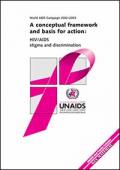Publications - Released in 2002
Stigma and discrimination associated with HIV and AIDS are the greatest barriers to preventing further infections, providing adequate care, support and treatment and alleviating impact. HIV/AIDS-related stigma and discrimination are universal, occurring in every country and region of the world. They are triggered by many forces, including lack of understanding of the disease, myths about how HIV is transmitted, prejudice, lack of treatment, irresponsible media reporting on the epidemic, the fact that AIDS is incurable, social fears about sexuality, fears relating to illness and death, and fears about illicit drugs and injecting drug use.
HIV/AIDS-related stigma does not arise out of the blue, nor is it something dreamed up in the minds of individuals. Instead, like responses to diseases such as leprosy, cholera and polio in the past, it plays to deep-rooted social fears and anxieties. Understanding more about these issues, and the social norms they reinforce, is essential to adequately responding to HIV/AIDS-related stigma and discrimination. Otherwise, we run the risk of developing programmes and interventions that are not comprehensive, thus achieving little impact.
Downloads
Organizations
- Joint United Nations Programme on HIV/AIDS (UNAIDS)






